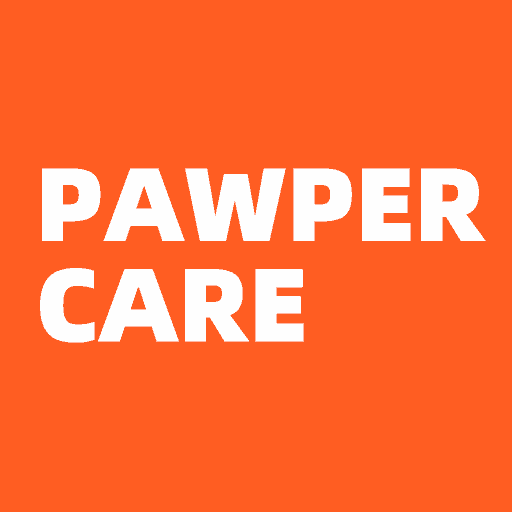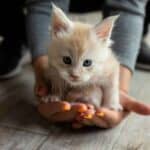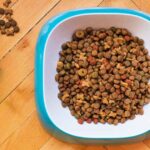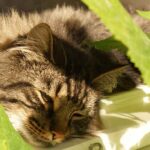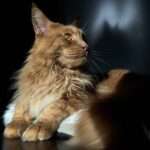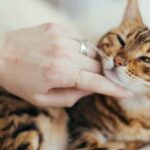If you have a cat and a dog in your house, you might have wondered: can a cat eat dog food?
Or perhaps you’ve caught your cat sneaking a few bites of your dog’s meal and worried about the consequences.
Let’s explore what happens if cats eat dog food, whether they can eat it for just one day, the differences between cat and dog food, how to keep dog food away from your cat, and what to feed your cat if you run out of food.
Contents
ToggleWhat happens if cats eat dog food?
Dog food is not ideal for cats. Doing so occasionally, however, is unlikely to cause severe harm.
But if a cat consistently consumes dog food instead of cat food, it may develop nutritional deficiencies and other health issues.
One primary reason is that cats are obligate carnivores, meaning they require a diet primarily consisting of animal-based proteins, whereas dogs are omnivores and can survive on a more varied diet.
Consequently, cat food is formulated to meet the unique nutritional needs of felines, while dog food is designed for dogs.
Can cats eat dog food for one day?
If your cat happens to eat dog food for just one day, there’s no need to panic.
The occasional consumption of dog food will not cause any significant harm to your feline friend.
However, it’s crucial to refrain from feeding your cat dog food, as doing so can lead to nutritional imbalances and other health problems in the long run.
Differences between cat food and dog food
There are several key differences between cat food and dog food, which make them unsuitable substitutes for each other:
- Protein content: Cats require a higher protein content in their diet than dogs do. Cat food typically contains more animal-based proteins, while dog food has a more varied mix of proteins, including plant-based sources.
- Taurine: Cats need taurine, an essential amino acid that helps maintain their cardiovascular and visual health. Unlike dogs, cats cannot synthesize taurine on their own and must obtain it from their diet. Cat food is fortified with taurine, while dog food generally has lower levels of this crucial nutrient.
- Vitamin A: Cats cannot convert beta-carotene into vitamin A, vital for maintaining healthy skin, vision, and immune function. Cat food contains preformed vitamin A to meet this need, whereas dog food relies more on beta-carotene.
- Fatty acids: Cats need arachidonic acid, an essential fatty acid that helps maintain their skin and coat health. Dog food often lacks sufficient arachidonic acid because dogs can synthesize it from other fatty acids.
- Fiber content: Dog food generally contains more fiber than cat food, as dogs can benefit from a higher fiber content in their diet. Cats, being obligate carnivores, have a limited ability to digest plant-based fibers.
How to keep dog food away from your cat
To prevent your cat from consuming dog food, consider the following tips:
- Feed pets separately: Designate separate feeding areas for your cat and dog. Ensure they eat their meals in these designated spaces and do not leave dog food out when your cat has access to it.
- Elevate dog food: Place the dog’s food bowl on an elevated surface, such as a countertop or a raised pet feeder. This will make reaching the dog food more difficult for your cat.
- Use puzzle feeders or slow feeders for your dog: These feeding devices can make it harder for your cat to steal dog food, as they require the eater to work for their food.
- Supervise mealtimes: Keep an eye on your pets during mealtime to ensure they eat their food and do not steal each other’s.
What can I feed my cat if I run out of food?
If you find yourself out of cat food and unable to buy more immediately, consider the following short-term solutions:
- Cooked meat: Offer your cat plain, cooked meat without seasoning, such as chicken, turkey, or beef. Avoid feeding raw meat, as it may contain harmful bacteria.
- Canned fish: You can offer your cat canned fish, such as tuna or salmon, in moderation. Ensure the fish is packed in water and not oil, and avoid fish with added salt.
- Scrambled eggs: Plain, cooked scrambled eggs without any seasoning can serve as a quick meal for your cat.
- Cooked vegetables: Although cats are obligate carnivores, they can tolerate small amounts of cooked vegetables, such as carrots, green beans, or peas. However, vegetables should not make up a significant portion of their diet.
Remember, these options should only serve as temporary solutions until you can purchase more cat food.
Feeding your cat a balanced, species-appropriate diet is essential to ensure they receive all the necessary nutrients for optimal health.
Final Thoughts
While cats can eat dog food without experiencing immediate harm, feeding them dog food consistently is not a healthy option.
The nutritional differences between cat and dog food make them unsuitable substitutes for one another.
To ensure your cat stays healthy, feed them a balanced, species-appropriate diet and keep dog food out of their reach.
References
- AVMA. (2018). Selecting the Best Food for Your Pet. Retrieved from https://www.avma.org/resources/pet-owners/petcare/selecting-best-food-your-pet
- Cummings Veterinary Medical Center at Tufts University. (2017). The Differences Between Cat and Dog Food.
- Little, S. (2013). The Cat: Clinical Medicine and Management. Elsevier Health Sciences.
- Morris, J. G., & Rogers, Q. R. (1994). Assessment of the Nutritional Adequacy of Pet Foods through the Life Cycle. Journal of Nutrition, 124(12_Suppl), 2520S-2534S.
